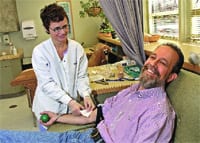State’s First Step In Hospital Relief Falls Far Short
It’s a first step.
That’s what hospital administrators and medical professionals are saying about the hospital relief included in the long-delayed but now approved FY 2002 state budget.
You can hear the concern in their voices when they talk about the lingering problems with financial struggles, woefully inadequate Medicaid reimbursement, and the unfairness of the funding structure for the uncompensated care pool.
But their words carry some optimism and even gratitude — and why not? It took years of hard lobbying to convince elected officials that medicaid underfunding is at the core of the hospitals’ struggles, and they probably feel obligated to show some admiration for the baby steps the Legislature and Acting Gov. Jane Swift took to help them.
But let’s not dance around the truth — baby steps they are, and if not followed with additional, meaningful measures, they won’t amount to much. Hospitals asked for a meal — at least an entree — and were thrown scraps. It’s just not enough.
Take, for example, the uncompensated care pool, into which all state hospitals contribute annually. The money is redistributed to hospitals based on the number of uninsured and underinsured patients they see. Hospitals that come out on the losing end — about three-quarters of them — complain that they, too, care for needy patients at their own cost, and the state should do more to provide for that contingent at all hospitals. Currently, the fund takes in $215 annually from hospitals, $100 million from private insurers, and just $30 million from the state.
The Mass. Hospital Assoc. (MHA) spent the year lobbying for action that would increase the state’s share by $100 million, to $130 million, thereby relieving hospitals of an equal burden. The state provided one-year relief totaling $45 million, a compromise that leaves far more questions than answers. A commission established to study how the pool is currently structured hopes to answer some of those questions.
And with most hospitals struggling due to a Medicaid system that reimburses, on average, 71 cents on the dollar for care, the MHA has also been at the forefront of a push to close that gap. But the FY 2002 budget allocated merely $15 million to begin to address the deficiency, and a $15 million fund was established to benefit “distressed” hospitals — a term that all hospital administrators feel should apply to their institutions but likely will not.
Granted, the events of Sept. 11 have shaken budget priorities not only in Massachusetts but across the country. Preparing for the threat of terrorism — including bioterrorism — has now become a costly priority that, unfortunately, squeezes out other initiatives. After all, the revenue flows aren’t unlimited — not federally, and certainly not in any state. But as Hank Porten, president of Holyoke Hospital, said, lawmakers want hospitals to prepare for disasters, but what they don’t realize is that every day has the potential to be a disaster, what with insufficient staff, emergency room diversions, and simply not enough money to pay for the services patients need and demand.
Meanwhile, as the population rises and ages simultaneously, demand is expected to increase exponentially for prescription drugs and medical services — and those services promise to be expensive, as 21st-century scientists develop new and better ways to fight illness. The century might see wonderful new treatments developed to keep people alive, but people living longer comes at a great cost for the health care industry, which is one of the Commonwealth’s driving economic forces.
Massachusetts, with its wealth of medical and educational resources, should not rank among the bottom states in America when it comes to medical reimbursement.
That’s simply an embarrassment. No one said fixing the problem would be easy. But applying a Band-Aid to these difficult issues isn’t going to resolve them. So we’re not going to cheer wildly what the FY 2002 budget holds for hospitals. We’ll just restate the obvious.
It’s a first step.
But that’s all.


